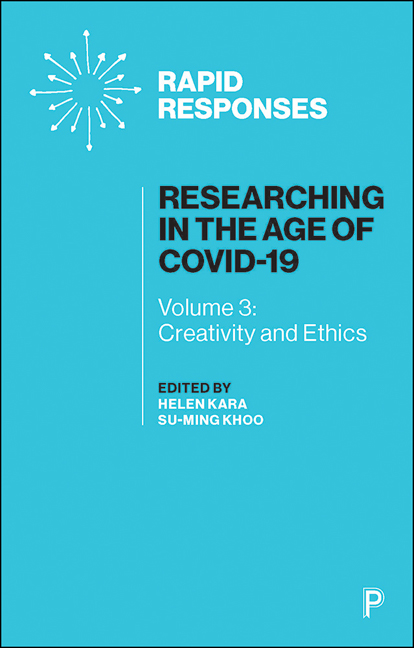2 - ‘Crafting During Coronavirus’: Creative Diary Approaches for Participant-Centred Research
Published online by Cambridge University Press: 23 March 2021
Summary
Introduction
When COVID-19 emerged globally, researchers had to renegotiate research methods, their relationship with time and the unprecedented blurring of work and home. This raised questions of how to conduct methodologically and ethically sound creative research whilst being sensitive to lived experiences. Addressing this led to a focus on crafting and the potential benefits of diaries for capturing thoughts and feelings. There is a wealth of literature affirming the creative use of diaries (Välimäki et al, 2007; Kara, 2015; Mannay, 2016; Meth, 2017; Herron et al, 2019). However, diaries are time and energy consuming. This chapter offers a new insight into the ‘in-practice’ use of diaries through the ‘Crafting during Coronavirus’ research project.
‘Crafting during Coronavirus’
When fears around COVID-19 started to take hold, Naomi saw that her Instagram feed was flooded with ‘lockdown making’ and ‘coronavirus creativity’. We did not want people's narratives of making during this crisis to be lost and we wanted to bear witness to their thoughts and experiences as well as their makes. People's experiences and thoughts are diverse, complex and subjective so creative methods, allowing participants to tell their story in their own words and in their own time, are both ethical and credible (Brinkman, 2012).
Following ethical approval from the University of Bristol, the ‘Crafting during Coronavirus’ (CDC) research project was shared on social media platforms from 4 April 2020 with a weblink to Naomi's website with project information (Clarke, 2020). Having an established online presence enabled participants to legitimize Naomi's identity and experience. Naomi, a PhD student and crafter with 23 years’ experience, utilized her creative connections to extend the reach of the research. Relying on digital connections is complex. It can be beneficial for enabling access to a broad geographical dispersion of participants more cost-effectively than most qualitative methods (Kara, 2015). It can also, however, bias the sample towards those with digital access and technical know-how (Duffy, 2002). In total, 576 people signed the participation consent survey. All participants were emailed with an individual ‘welcome’ message including the ‘diary template’, information about the diary sections, time frames and encouragement to make the diary their own. Of the 576 participants, 120 withdrew. Of the remaining 456, 317 actively participated by regularly sharing their diaries, crafting, making and experiences.
- Type
- Chapter
- Information
- Researching in the Age of COVID-19Volume III: Creativity and Ethics, pp. 19 - 28Publisher: Bristol University PressPrint publication year: 2020



